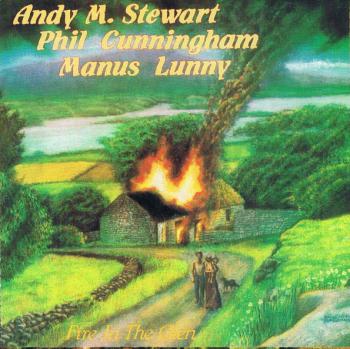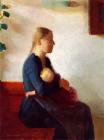Gur e mise tha tùrsach,
A' caoidh cor na dùthcha,
'S nan seann daoine cùiseil
Bha cliùiteach is treun;
Rinn uachdarain am fuadach
Gu fada null thar chuantan,
Am fearann ga thoirt bhuapa
'S thoirt suas dha na fèidh.
'S e sud a' chulaidh-nàire,
Bhith faicinn dhaoine làidir
Gam fuadach thar sàile
Mar bhàrrlach gun fheum.
'S am fonn a bha àlainn
Chaidh chur fo chaoraich bhàna;
Tha feanntagach 's a' ghàradh,
'S an làrach fo fheur.
Far an robh mòran dhaoine
Le 'm mnathan is le'n teaghlaich,
Chan eil ach caoraich-mhaola
Ri fhaotainn 'n an àit';
Chan fhaicear air a' bhuailidh
A' bhanarach le buaraich
No idir an crodh guaillfhionn
'S am buachaile bàn.
Tha 'n uiseag anns na speuran
A' seinn a luinneig ghleusda,
'S gun neach a tha ga h-èisteachd,
Nuair dh'èireas i àrd.
Cha till, cha till na daoine,
Bha cridheil agus aoigheil,
Mar mholl air latha gaoithe,
Chaidh 'n sgaoileadh gu bràth.
A' caoidh cor na dùthcha,
'S nan seann daoine cùiseil
Bha cliùiteach is treun;
Rinn uachdarain am fuadach
Gu fada null thar chuantan,
Am fearann ga thoirt bhuapa
'S thoirt suas dha na fèidh.
'S e sud a' chulaidh-nàire,
Bhith faicinn dhaoine làidir
Gam fuadach thar sàile
Mar bhàrrlach gun fheum.
'S am fonn a bha àlainn
Chaidh chur fo chaoraich bhàna;
Tha feanntagach 's a' ghàradh,
'S an làrach fo fheur.
Far an robh mòran dhaoine
Le 'm mnathan is le'n teaghlaich,
Chan eil ach caoraich-mhaola
Ri fhaotainn 'n an àit';
Chan fhaicear air a' bhuailidh
A' bhanarach le buaraich
No idir an crodh guaillfhionn
'S am buachaile bàn.
Tha 'n uiseag anns na speuran
A' seinn a luinneig ghleusda,
'S gun neach a tha ga h-èisteachd,
Nuair dh'èireas i àrd.
Cha till, cha till na daoine,
Bha cridheil agus aoigheil,
Mar mholl air latha gaoithe,
Chaidh 'n sgaoileadh gu bràth.
Contributed by Bernart Bartleby - 2014/3/5 - 14:22
Language: English
Traduzione inglese che Mudcat Café attribuisce allo stesso autore.
THE DISPERSION OF THE HIGHLANDERS
I mourn for the Highlands, Now drear and forsaken;
The land of my fathers, The gallant and brave;
To make room for the sportsman Their lands were all taken,
And they had to seek out New homes over the wave.
Where once smiled the garden, Rank weeds have their station.
And deer are preferred To a leal-hearted race.
Oh, shame on the tyrants Who brought desolation,
Who banished the brave And put sheep in their place.
Oh ! where are the parents And bairns yonder roaming
The scene of their gladness Is far o'er the main ;
No blithe-hearted milk-maid Now cheers us at gloaming ;
The herd-boy no longer Is seen on the plain.
The lark is still soaring, and sings in his glory,
With no one to listen His sweet morning lay;
The clansmen are gone-- But their deeds live in story--
Like chaff in the wind, they were borne far away.
I mourn for the Highlands, Now drear and forsaken;
The land of my fathers, The gallant and brave;
To make room for the sportsman Their lands were all taken,
And they had to seek out New homes over the wave.
Where once smiled the garden, Rank weeds have their station.
And deer are preferred To a leal-hearted race.
Oh, shame on the tyrants Who brought desolation,
Who banished the brave And put sheep in their place.
Oh ! where are the parents And bairns yonder roaming
The scene of their gladness Is far o'er the main ;
No blithe-hearted milk-maid Now cheers us at gloaming ;
The herd-boy no longer Is seen on the plain.
The lark is still soaring, and sings in his glory,
With no one to listen His sweet morning lay;
The clansmen are gone-- But their deeds live in story--
Like chaff in the wind, they were borne far away.
Contributed by Bernart Bartleby - 2014/3/5 - 14:23
Language: English
Altra versione inglese (forse più letterale) trovata qui
THE EVICTION OF THE HIGHLANDERS
I am so sad
Mourning for the state of the country
And the old thrifty people
Who were worthy and courageous.
Landlords evicted them
Far over the seas;
Their lands were taken from them
And given up to the deer.
That was a matter of shame,
To see strong people
Being evicted over the ocean
Like useless debris;
And the beautiful land
Occupied by Cheviot sheep.
There are nettles in the garden
And the ruins covered with grass.
Where there were many men
With their wives and families,
There are only hornless sheep
To be found in their place.
You cannot see in the cattle-fold
The milkmaid with her fetter,
Or the white-shouldered cattle
And the fair-haired herdsman.
The lark is in the skies
Singing her tuneful song,
With no one listening to her
As she climbs higher.
The people will never return, never return,
Who were hearty and genial;
Like chaff on a windy day
They were dispersed for ever.
I am so sad
Mourning for the state of the country
And the old thrifty people
Who were worthy and courageous.
Landlords evicted them
Far over the seas;
Their lands were taken from them
And given up to the deer.
That was a matter of shame,
To see strong people
Being evicted over the ocean
Like useless debris;
And the beautiful land
Occupied by Cheviot sheep.
There are nettles in the garden
And the ruins covered with grass.
Where there were many men
With their wives and families,
There are only hornless sheep
To be found in their place.
You cannot see in the cattle-fold
The milkmaid with her fetter,
Or the white-shouldered cattle
And the fair-haired herdsman.
The lark is in the skies
Singing her tuneful song,
With no one listening to her
As she climbs higher.
The people will never return, never return,
Who were hearty and genial;
Like chaff on a windy day
They were dispersed for ever.
Contributed by Bernart Bartleby - 2014/3/5 - 14:24
Una versione in inglese, con il titolo “I Mourn For The Highlands”, è presente nel disco di Andy M. Stewart, Phil Cunningham e Manus Lunny intitolato “Fire In The Glen”, del 1985.


Bernart Bartleby - 2014/3/5 - 14:36
×
![]()
Note for non-Italian users: Sorry, though the interface of this website is translated into English, most commentaries and biographies are in Italian and/or in other languages like French, German, Spanish, Russian etc.





Parole di Henry Whyte, Fionn il suo nome di penna, scrittore scozzese in lingua gaelica, nella raccolta intitolata “The Celtic Garland of Gaelic Songs and Readings: Translation of Gaelic and English Songs” edita a Glasgow nel 1920.
Sulla melodia della tradizionale “Lord Lovat's Lament” (un classico per cornamusa)
Testo trovato qui e confrontato con quello (meno esatto e privo di accenti) presente su Mudcat Café
Tra la seconda metà del 700 e la prima dell’800 le popolazioni rurali delle Highlands scozzesi furono costrette, prima consensualmente poi con la forza, ad abbandonare le loro terre. I grandi proprietari avevano infatti constatato che una pecora forniva più reddito di un contadino e che le Highlands liberate dagli esseri umani che le abitavano avrebbero fornito pascoli sterminati per immense greggi. L’innovazione voluta dai landowners fu sostenuta – com’è ovvio – dal Governo e dalla Legge. La gente fu prima sospinta sulle coste, convinta che pescando e coltivando alghe per estrarre coloranti per i tessuti se la sarebbe cavata… Naturalmente non fu così, e per moltissimi fu miseria, fame e morte… A coloro che cercarono di resistere agli espropri e alle deportazioni fu data la caccia con la stessa spietatezza riservata ai fuorilegge… L’esito finale fu prima l’esodo verso le Lowlands ma in seguito soprattutto l’emigrazione massiccia verso America, Australia e Nuova Zelanda.
Il fenomeno, che si svolse in fasi alterne più o meno cruente, durò oltre 100 anni, ed è noto come “Highland Clearances”, ma in gaelico scozzese rende meglio l’idea: “Fuadach nan Gàidheal”, ossia “Espulsione dei Gaeli (gli Scoti)”
Sulle “Highland Clearances” si veda anche Shores of Sutherland.